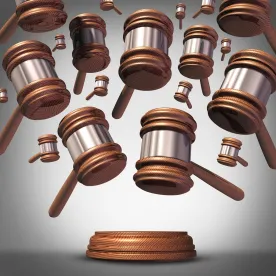The New Jersey Court Rules were amended in July 2020, effective September 1, 2020. A number of these amendments are important for litigators, and this post provides a summary.
New Jersey Court Rules Governing Motion Practice
RULE 4:6-2: MOTIONS TO DISMISS FOR FAILURE TO STATE A CLAIM
Rule 4:6-2 (“How Presented”) governs assertion of defenses. The amendments target the Rule’s provisions governing motions to dismiss for failure to state a claim upon which relief may be granted. Previously, motions to dismiss were calendared on New Jersey’s typical 16-day cycle for motions, with motion papers required to be filed at least 16 days prior to the motion’s return date. The amended Rule now requires such motion papers to be served in accordance with Rule 4:46-1 – New Jersey’s Rule governing summary judgment motions.
Now, motions to dismiss for failure to state a claim must be filed at least 28 days prior to the motion’s return date. (New Jersey motion days are typically every other Friday, with certain exceptions for holidays.) The Rule amendment did not extend a moving party’s time to file a reply; movants still only have 4 days to file reply briefs – a Monday deadline following Thursday opposition – making for a busy weekend before the motion’s return date.
RULE 4:25-8: MOTIONS IN LIMINE
Rule 4:25-8 governs motions in limine. The amended Rule defines a motion in limine as “an application returnable at trial for a ruling regarding the conduct of the trial, including admissibility of evidence, which motion if granted would not have a dispositive impact on a litigant’s case.” The amendment also clarifies which motions fall outside of the purview of Rule 4:25-8, including applications to bar an expert’s testimony where such testimony is required as a matter of law to sustain a party’s burden of proof.
Amended Rule 4:25-8 also makes it mandatory to include motions in limine as part of the pretrial exchange information required under Rule 2:55-7(b), and requires that each such motion address only a single issue, to the extent possible. The amended Rule limits briefs in support of motions in limine to 5 pages per motion, with a collective limit of 50 pages total. The court may reconsider any prior in limine ruling sua sponte or upon request based on developments at trial.
RULE 4:24-2: MOTIONS IN THE DISCOVERY PERIOD
Rule 4:24-2 governs motions required to be made during the discovery period. The Rule was amended to clarify that the same procedure applies to challenges to the credentials of plaintiffs’ and defendants’ medical experts in malpractice actions filed pursuant to the Patients First Act. Any party making such a challenge shall file a motion not later than 30 days from service of the at-issue expert’s report. The motion must be accompanied by a certification setting forth the movant’s alleged area of specialty and qualifications that form the basis for the challenge of the expert’s qualifications under the Patients First Act, plus a copy of the movant’s curriculum vitae.
This Rule does not apply to challenges of an expert who is the affiant, or other designated medical experts whose credentials have been the subject of a case management conference pursuant to Rule 4:5B-4.
Other New Jersey Court Rule Amendments
RULE 1:38-1A: REFERENCES TO INFORMATION EXCLUDED FROM PUBLIC ACCESS
Rule 1:38-1A governs court decisions referencing information concealed from public record. This new Rule provides that court decisions, oral or written and published or unpublished, may quote from or otherwise make reference to information in court records even when those records are excluded from public access.
New Jersey Court Rule Appendix Amendments
APPENDIX II: INTERROGATORY FORMS A AND A(1)
Appendix II, New Jersey’s Interrogatory Forms A and A(1), have been amended to delete the request for place of birth. This amendment is consistent with the judiciary’s ongoing practice of removing citizenship and immigration status from all forms unless there is a court-related need for such data. These forms also were amended to make clear that interrogatory responses may not be used for improper purposes and only may be used in full compliance with the New Jersey Court Rules and the New Jersey Rules of Professional Conduct.
APPENDIX XII-B1: CIVIL CASE INFORMATION STATEMENT
The standard form Civil Case Information Statement (CIS) has been amended to enable litigants to mark a matter as “multicounty litigation” or “consumer fraud,” two categories not previously included on the CIS.
Code of Judicial Conduct Amendments
CODE OF JUDICIAL CONDUCT 3.17(B)(4)(C): DISQUALIFICATION
Code of Judicial Conduct 3.17 governs disqualification of judges. This Rule was adopted to provide for disqualification of a judge when a law firm previously has represented the judge or the judge’s spouse or partner in a matter.
Conclusion
While some of these Rule amendments are relatively straightforward, others – such as the consequences of Rule 1:38-1A permitting the Court to quote information otherwise excluded from public access, or identifying when a judge must be disqualified under Code of Judicial Conduct 3.17(B)(4)(c) – will require some time and experience to assess the impact. These Rule changes emphasize the importance of retaining counsel with extensive local knowledge and experience when litigating in New Jersey.



 />i
/>i

